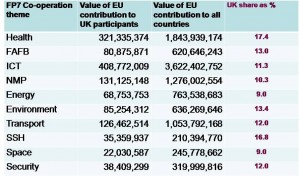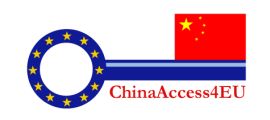 The next Framework Programme – Horizon 2020 – will be worth €80.2 billion if the European Commission gets its way, the proposal for the 2014-2020 EU budget has shown. This would represent a 46 per cent increase on the budget of Framework 7, which runs from 2007 to 2013 and is worth about €56bn. In a statement announcing the budget proposal, the Commission said that the increase is meant to boost Europe’s economy and shows a lasting commitment to research, science and innovation.
The next Framework Programme – Horizon 2020 – will be worth €80.2 billion if the European Commission gets its way, the proposal for the 2014-2020 EU budget has shown. This would represent a 46 per cent increase on the budget of Framework 7, which runs from 2007 to 2013 and is worth about €56bn. In a statement announcing the budget proposal, the Commission said that the increase is meant to boost Europe’s economy and shows a lasting commitment to research, science and innovation.
Category / EU
Welcome to the EU section of the blog! Emily Cieciura (BU’s Research Facilitator – EU and International), Jo Garrad (Funding Development Manager) and Dianne Goodman (Funding Development Co-ordinator) together try to take the pain out of finding and applying for EU funding by horizon scanning many sources and placing the most important information on this page.
We blog as often as possible on everything from calls for proposals and partner searches, to networking event opportunities, all the latest on Horizon 2020 and international funding. We also use the blog to disseminate information on EUADS (BU’s EU academic training initiative), how to write brilliant proposals, how to find partners and other top tips!
Europe 2020: latest Structural Funds update
 The latest EU proposals reveal several key issues for UK Structural Funds which are summarised below.
The latest EU proposals reveal several key issues for UK Structural Funds which are summarised below.
Less money for the UK: the amount received by the UK is likely to fall (as GDP is higher than in other Member States). The overall budget for the structural funds at EU level will remain roughly the same (€376 billion); the greatest proportion will be earmarked for poor areas below 75% of the EU GDP average (unlikely to be any in England). The levels of total investment will still be significant and all areas will continue to have at least some access to funds.
New opportunities for part of England: there is opportunity for some areas of England to benefit from greater levels of structural funding. In the current programme, areas were either identified as rich (competitiveness) or poor (convergence) with some phasing in areas in between, receiving levels of funding accordingly. From 2014 it is proposed a new transition category be created between the two, at the level 75%-90% GDP, which would receive greater levels of funding than competitiveness areas. All other areas, with a GDP above 90%, will continue to benefit from competitiveness funding as they do now.
Tightening priorities: structural funds may be targeted at a fewer number of EU priorities. Competitiveness and transition areas will be required to focus economic development spending (ERDF) on energy efficiency, renewable energies, SME competitiveness and innovation. It is also proposed at least half of structural funds must be spent on skills development projects (ESF) in next programme round.
Stronger performance management: the EU will negotiate a partnership contract with the UK government, setting out a commitment for spending structural funds to address priorities and progress will be assessed through a performance framework measuring outcomes.
New funds for research, infrastructure and education: a range of expenditure lines will be integrated into three new EU-wide programmes: a ‘Connecting Europe Facility’ is proposed to offer €40 billion into transport, energy and ICT infrastructure projects; ‘Horizon 2020’ will integrate a range of research and innovation funds into a single €80 billion programme; and a single education and youth programme of €15.2 billion will integrate the range of youth development, learning and exchange funds.
Rural development: the rural development element of the Common Agricultural Policy (CAP) will receive €89.9 billion from 2014-20, and will be subject to similar performance and conditionality measures like structural funds. Funding for farm payments is proposed at €281.8 billion, roughly the same as current. The EU will make proposals permitting flexibility between the rural development and farm payment funds.
More coordinated spending: a common strategic framework for ERDF, ESF, the rural development programme will aim to join up the strategic ambitions of the different funds, as driven by the EU2020 strategy.
Financial engineering instruments: proposals place more emphasis on using the EU budget to leverage additional private sector investment.
Simplified administration: proposals aim to simplify, speed up and improve administration and delivery, requiring that both the EU and member states commit to radical simplification.
Negotiation timetable: proposals must be agreed unanimously by Member States, who are working towards an agreement for the end of 2012. Alongside this, important detail for each of the individual funds will be published in the autumn 2011, and Government is beginning to plan how funding programmes will be administered in England.
not quite EU but China & UK sign new agreement!
Scientific and technical collaboration between the United Kingdom and China has expanded further with the signing of a new agreement covering sectors including energy, advanced engineering and life sciences. The Science and Technology Facilities Council (STFC) and the China Guanghua Science and Technology Foundation have signed a Memorandum of Understanding (MOU), coinciding with the meeting in London of Prime Minister David Cameron and Chinese Premier Wen Jiaba o.
o.
ERAB: The European Foundation for Alcohol Research grants available
 These fund any aspect of biomedical or psychosocial research into beer or alcohol. Grants are worth €50,000 per annum over one to two years and the deadline is 10th April 2012.
These fund any aspect of biomedical or psychosocial research into beer or alcohol. Grants are worth €50,000 per annum over one to two years and the deadline is 10th April 2012.
How difficult is getting FP7 funding? Not too hard for some UK and EU fraudsters!
 Nature has reported that the European Anti-Fraud Office are currently in the process of prosecuting project consortia who received EU grants for fake research projects. The fraud was committed by a number of beneficiaries who appear to have made up entire research projects, including whole research teams, fictitious companies and subcontractors, and won EU grants for these projects. It appears that the projects were designed solely to obtain the funds and that no actual research activity was carried out.
Nature has reported that the European Anti-Fraud Office are currently in the process of prosecuting project consortia who received EU grants for fake research projects. The fraud was committed by a number of beneficiaries who appear to have made up entire research projects, including whole research teams, fictitious companies and subcontractors, and won EU grants for these projects. It appears that the projects were designed solely to obtain the funds and that no actual research activity was carried out.
Four collaborative projects under in the ICT area were terminated by the European Commission, and several individuals were charged for the fraud. Further projects are currently being investigated in the UK, France, Greece, Austria, Sweden, Slovenia and Poland.
It should be stressed that this is a very rare and unusual example of fraud in EU grants, especially when it comes to research grants, and it seems it is never possible to completely prevent fraud, even with the already very strict and robust systems in place for the Framework Programme. Overall, there continues to be a lot of support for simplification of the EU funding programmes including for greater acceptance of own (nationally approved) accounting systems, clarity and consistency.
How to find partners for EU Projects
 European Commission projects usually require partners, with the number and geographical location varying for each call. A useful tip to remember when considering your partner options is that a consortium should include a good balance of sectors industry, academia, user groups etc) and that all partners should be well-matched to the activities in the proposal.
European Commission projects usually require partners, with the number and geographical location varying for each call. A useful tip to remember when considering your partner options is that a consortium should include a good balance of sectors industry, academia, user groups etc) and that all partners should be well-matched to the activities in the proposal.
You can find partners through your existing contacts, by reviewing previously awarded FP6 and FP7 projects, by searching/ advertising on the UKRO website ,
by seeking the assistance of the relevant UK National Contact Point and by attending EU conferences and project evaluations, by scanning the CORDIS website.
The best and most effective way to become involved in FP7 consortia however, is to join European Technology Platforms (ETPs). These are groups of industry-led stakeholder forums who explore Europe’s key challenges. ETPs define the EU Strategic research agenda and then bid for European Commission funds (through FP7 etc) to address these. The biggest players in the field across Europe belong to these groups and obviously as they set the research agenda, they are increduibly successful at winning FP7 funds for research. Joining these groups will not only open you to a plethora of partners but also will allow you to contribute in shaping the research agenda of Europe (which you can then address through funding). Some of the major ETPs are listed below with hyperlinks to their webpages:
Advanced Engineering Materials and Technologies
Advisory Council for Aeronautics Research in Europe
Embedded Computing Systems
European Biofuels Technology Platform
European Construction Technology Platform
European Nanoelectronics Initiative Advisory Council
European Rail Research Advisory Council
European Road Transport Research Advisory Council
European Space Technology Platform
European Steel Technology Platform
European Technology Platform for the Electricity Networks of the Future
European Technology Platform for Wind Energy
European Technology Platform on Smart Systems Integration
European Technology Platform on Sustainable Mineral Resources
Farm Animal Breeding and Reproduction Technology Platform
Food for Life
Forest based sector Technology Platform
Future Manufacturing Technologies
Future Textiles and Clothing
Global Animal Health
Industrial Safety ETP
Integral Satcom Initiative
Mobile and Wireless Communications
Nanotechnologies for Medical Applications
Networked and Electronic Media
Networked European Software and Services Initiative
Photonics21
Photovoltaics
Plants for the Future
Robotics
Sustainable Nuclear Technology Platform
Sustainable Chemistry
Water Supply and Sanitation Technology Platform
Waterborne ETP
Zero Emission Fossil Fuel Power Plants
EU Intellectual Property/ technology transfer funding
 EIB-universities proposal for three new research action sponsorships: projects should cover European intellectual property regimes and their impact on technology transfer/IP finance; analysis of investment needs in infrastructure sectors; the rising of credit risk in microcredit: origins, warning signals, current state and future prospects. Funding of up to €100,000 per year is available for a period of three years. Deadline 16.09.11
EIB-universities proposal for three new research action sponsorships: projects should cover European intellectual property regimes and their impact on technology transfer/IP finance; analysis of investment needs in infrastructure sectors; the rising of credit risk in microcredit: origins, warning signals, current state and future prospects. Funding of up to €100,000 per year is available for a period of three years. Deadline 16.09.11
FP7 Cooperation Theme: what subjects are covered?
 The Cooperation theme is divided into 11 different topics; clicking on the hyperlink below will display the focus of the calls covered under each of these.
The Cooperation theme is divided into 11 different topics; clicking on the hyperlink below will display the focus of the calls covered under each of these.
Health
Food, Agriculture, Fisheries and Biotechnology
Energy
ICT (Computing)
NMP(Nanosciences)
Socio-Economic Sciences & Humanities
Transport
Security
Space
Joint Technology Initiatives (JTI)
Public-Private Partnerships
FP7 Security 2012 Call update and slides from Info Day available!
 The FP7 Security Call will be published on 20 July 2011 and new features to be included in the 2012 Work Programme are:
The FP7 Security Call will be published on 20 July 2011 and new features to be included in the 2012 Work Programme are:
- a new aspect of the 2012 Security Work Programme is the inclusion of pilot funding for Pre Operational Validation;
- an open topic for SMEs has been included in the 2012 Work Programme: SEC.2012.7.2-1 “Advancing contemporary laboratory forensic methods & equipment”. Under this topic at least 50% of the EC funding needs to go to SMEs;
- assistance in finding partners for FP7 Security proposals will be available on-line at the Partnering Platform website, operated (and quality controlled) by the German National Contact Point.
Slides are available from an ICT Security Info Day which was held at Aston University Business School last week.
EU funding: not as hard as you might think to win
 The UK as a whole does pretty well when it comes to obtaining EU funding. We receive the second largest share of FP7 funding; €2.28 billion (equivalent to 14.4% of the total FP7 funding) and we are involved in more successful projects than France and Germany (41.0% of all grant agreements in FP7). As you can see from this table, the UK has obtained a great deal of funding from the FP7 Cooperation fund.
The UK as a whole does pretty well when it comes to obtaining EU funding. We receive the second largest share of FP7 funding; €2.28 billion (equivalent to 14.4% of the total FP7 funding) and we are involved in more successful projects than France and Germany (41.0% of all grant agreements in FP7). As you can see from this table, the UK has obtained a great deal of funding from the FP7 Cooperation fund. 
Over the next few months, I will be posting tips on how to find funding, how to write proposals, find partners etc. to help you to begin to explore the EU as a good source of funding.
EU energy related funding available
 EU Eco-innovation projects funding: to support the market penetration of an environmental product, service, management practice or process with a proven track record, but which has not yet been fully marketed. The indicative budget for this call is €36 million and funding will provide up to 50 per cent of a project’s costs over a period of 36 months. Deadline 08.09.11
EU Eco-innovation projects funding: to support the market penetration of an environmental product, service, management practice or process with a proven track record, but which has not yet been fully marketed. The indicative budget for this call is €36 million and funding will provide up to 50 per cent of a project’s costs over a period of 36 months. Deadline 08.09.11
EUROGIA+ funding call: projects should develop innovative energy technologies that will reduce the carbon footprint of energy production and use, with a focus on solar, wind, biomass, geothermal and energy efficiency. Deadline 14.09.11
Design options for sectoral carbon market mechanisms and their implication for the EU ETS: projects should help to improve understanding of different options for key design elements of the sector-wide carbon market mechanisms, as well as assessing the implications of recognising credits from such pilots for use under the EU ETS. Funding is worth between €180,000 and €200,000 over nine months. Deadline 16.08.11
Integration of renewable energy in Europe: project should provide quantitative and qualitative analysis of the electricity market, the transmission network and the distribution network in its ability to adapt to higher penetration of electricity from renewable energy. Funding covers approximately 500 person-days. Deadline 23.08.11
ChinaAccess4EU funding available
 ChinaAccess4EU project is funded by FP7, aiming to increase the awareness and dissemination in the EU of access opportunities for European researchers and research organisations in Chinese national research and innovation programmes. There is a series of newly published calls under the themes Strategic Public Policy Research; Collaborative Research; and Health Care and Promotion.
ChinaAccess4EU project is funded by FP7, aiming to increase the awareness and dissemination in the EU of access opportunities for European researchers and research organisations in Chinese national research and innovation programmes. There is a series of newly published calls under the themes Strategic Public Policy Research; Collaborative Research; and Health Care and Promotion.
AHRC survey on International Collaboration
 The AHRC is currently carrying out a survey to gather vital information about International collaborations in order gain a greater understanding. The 10 minute survey provides an opportunity to inform the AHRC of your experience in International collaboration and feed into the on-going development of the AHRC’s international activities- including FP7 participation. The deadline for submission is 10th July 2011.
The AHRC is currently carrying out a survey to gather vital information about International collaborations in order gain a greater understanding. The 10 minute survey provides an opportunity to inform the AHRC of your experience in International collaboration and feed into the on-going development of the AHRC’s international activities- including FP7 participation. The deadline for submission is 10th July 2011.
Call for bids: UK-India Education and Research Initiative Phase Two
 The first call for bids for Phase Two of UKIERI has been launched and has confirmed funding from the UK and Indian Governments of £5 million annually over the next three years.
The first call for bids for Phase Two of UKIERI has been launched and has confirmed funding from the UK and Indian Governments of £5 million annually over the next three years.
Phase two of the programme concentrates on four key areas: leadership from school to universities; innovation partnerships between higher and further education institutions in UK and India; skills development; and the mobility of students and qualifications. The first round closes on 5 August 2011.
Catalogue of EU Funded Projects in Environmental Research 2007-11 published
 This catalogue presents information on 337 projects selected for funding under the ‘Environment (including climate change)’ theme of FP7.
This catalogue presents information on 337 projects selected for funding under the ‘Environment (including climate change)’ theme of FP7.
Graphene EU conference proceedings published
 The EC has published the proceedings of the conference it organised on the potential for Graphene (a new material, based on common carbon, that presents surprising electrical, optical and mechanical properties, due to its two-dimensional structure), which it held earlier in the year. The aim of the event was to consider how to best exploit the industrial potential of Graphene.
The EC has published the proceedings of the conference it organised on the potential for Graphene (a new material, based on common carbon, that presents surprising electrical, optical and mechanical properties, due to its two-dimensional structure), which it held earlier in the year. The aim of the event was to consider how to best exploit the industrial potential of Graphene.
European focused funding available
 The Central Europe Programme offers funding for projects on the facilitating innovation across Central Europe; improving accessibility to, and within, Central Europe; using our environment responsibly; enhancing competitiveness and attractiveness of cities and regions. The budget for this call is at least €22.5 million and the recommended funding amount is €1m to €2.5m per project. Closing date: 14 October 2011
The Central Europe Programme offers funding for projects on the facilitating innovation across Central Europe; improving accessibility to, and within, Central Europe; using our environment responsibly; enhancing competitiveness and attractiveness of cities and regions. The budget for this call is at least €22.5 million and the recommended funding amount is €1m to €2.5m per project. Closing date: 14 October 2011
EU Social Sciences and Humanities funding available
 European instrument for democracy and human rights – enhancing respect for human rights and fundamental freedoms where they are most at risk and supporting human rights defenders: proposals should explore the enhancment, respect for human rights and fundamental freedoms in countries and situations where they are most at risk and where human rights defenders and civil society organisations work under severe constraints and are most under pressure. Grants are worth between €150,000 and €2m. Closing date: 1 August 2011.
European instrument for democracy and human rights – enhancing respect for human rights and fundamental freedoms where they are most at risk and supporting human rights defenders: proposals should explore the enhancment, respect for human rights and fundamental freedoms in countries and situations where they are most at risk and where human rights defenders and civil society organisations work under severe constraints and are most under pressure. Grants are worth between €150,000 and €2m. Closing date: 1 August 2011.
European instrument for democracy and human rights restricted call for proposals: proposals should explore contributions to the development and consolidation of democracy and the rule of law and respect for all human rights and fundamental freedoms. Grants are worth between €200,000 and €1.5m. Closing date: 1 August 2011.
European Policy Network on the Education of Children and Young People with a Migrant Background: proposals should address the issues raised by the November 2009 Council conclusions on the education of children from a migrant background and stimulate high-level cooperation between Member State policy makers responsible for social inclusion through education, including cooperation between authorities in the countries of origin and host countries. The network should actively stimulate transnational cooperation primarily at governmental level, but also at the level of experts and practitioners. Grants are worth €500,000. Closing date: 14 October 2011.











 ESRC Festival of Social Science 2024 Open Call – Deadline for Applications Thursday 16 May
ESRC Festival of Social Science 2024 Open Call – Deadline for Applications Thursday 16 May We can help promote your public engagement event or activity
We can help promote your public engagement event or activity Horizon Europe News – December 2023
Horizon Europe News – December 2023